Best Pajamas for Sensitive Skin should be soft, breathable, and hypoallergenic. The right fabric helps prevent rashes, irritation, and discomfort, ensuring your baby sleeps safely and soundly.
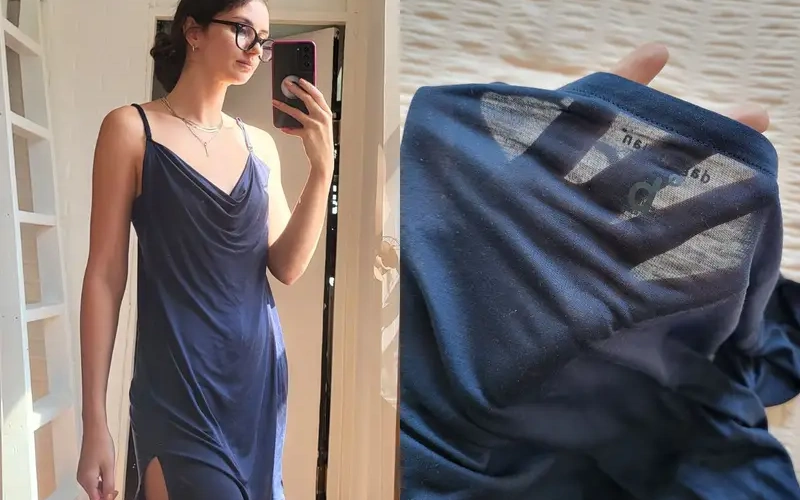
What is Sensitive Skin
If your baby has sensitive skin, choosing the right pajamas is essential. Soft, breathable fabrics can prevent irritation and ensure your little one sleeps comfortably through the night.
If you’ve ever felt itchy, irritated, or even slightly inflamed after slipping into your pajamas, you’re not alone. Sensitive skin is more common than most people think—affecting up to 60% of women and 40% of men globally, according to data cited by the Journal of Dermatological Science. And when it comes to nighttime wear, the stakes are even higher. You’re in contact with your sleepwear for 6-8 hours, making pajama fabric one of the most prolonged irritants or comfort-givers in your daily life.
How to Know if You Have Sensitive Skin? Often, it’s a combination of genetic factors, environmental triggers, and even hormonal changes. Common symptoms include redness, itching, burning sensations, and small bumps. For many, these reactions are exacerbated by synthetic fabrics or harsh textile chemicals.
When choosing pajamas, materials like polyester, spandex-heavy blends, or chemically dyed fabrics can cause microscopic abrasions or allergic responses. Add to that poor ventilation or rough seams, and you’ve got a recipe for discomfort.
As a pajama manufacturer specializing in skin-friendly textiles, we see firsthand how fabric choice dramatically affects the wearer’s comfort. That’s why our design starts with the skin—and ends in science-backed softness. But more on that soon.
Expert Tips for Choosing Pajamas for Sensitive Skin
Here’s where our years of hands-on manufacturing experience kick in. Choosing the right pajamas for sensitive skin isn’t just about softness—it’s about understanding why certain fabrics work and others don’t.
Fabrics to Embrace
Natural, breathable fabrics like organic cotton, bamboo viscose, and silk are your best friends. These materials are not only soft but also moisture-wicking and temperature-regulating, which is crucial for avoiding sweat-triggered rashes.
For instance, bamboo viscose is naturally hypoallergenic and resistant to odor-causing bacteria. According to Wikipedia’s article on bamboo textiles, the fiber’s round structure makes it gentle enough for baby clothing—and perfect for sensitive adult skin.
What to Avoid
Stay clear of synthetic fabrics like nylon, polyester, and acrylic blends. Even if they’re labeled “soft,” these materials often involve harsh dyes, flame retardants, or softeners that can irritate the skin. Avoid anything labeled “wrinkle-resistant” or “easy care”—those usually mean chemical finishes.
The Role of Organic Certification
Look for labels like GOTS (Global Organic Textile Standard) or OEKO-TEX® Standard 100. These guarantee the fabric is free from harmful substances. As manufacturers, we adhere to these certifications not just as a selling point, but as a promise to skin health.
Our Experience as Pajama Manufacturers: Why Fabric Matters Most

Over the past decade, we’ve field-tested thousands of fabric samples. Our mission? To craft the softest, safest pajamas for even the most reactive skin types. We don’t just manufacture—we innovate.
From sourcing pesticide-free organic cotton farms to creating proprietary blends like our CloudSoft™ bamboo-cotton hybrid, our focus is comfort that heals, not harms.
We comply with international standards like OEKO-TEX®, ensuring that every thread we use is certified free of 100+ known allergens. Moreover, our in-house testing involves real-world trials with people suffering from eczema, psoriasis, and contact dermatitis.
We don’t rely solely on lab tests—we believe in people-proofing our products. That’s why we offer free sample sets to dermatologists and allergists across the country to get their feedback before launching any new line.
And here’s what our wholesale partners and direct customers have to say: “These are the only pajamas I stock for my eczema clients,” writes Amanda, a boutique sleepwear retailer in Oregon. Another user, Claire from Austin, emailed us saying, “I stopped waking up itchy for the first time in years.” That’s the difference experience makes.
Best Natural Fabrics for Sensitive Skin Pajamas
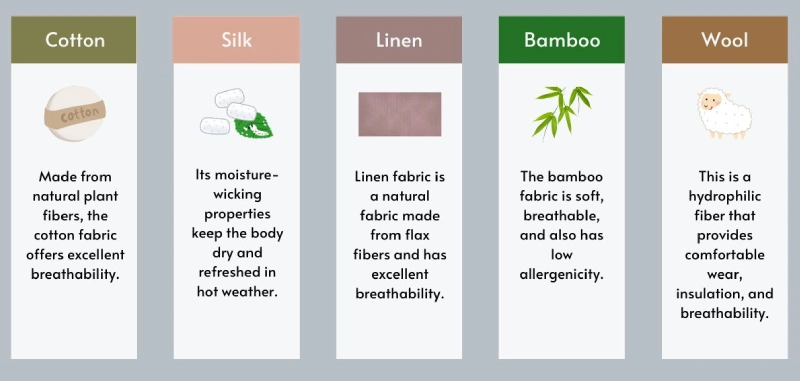
Choosing the right fabric is where the real game-changer happens—especially when you have sensitive skin. As sleepwear manufacturers with over a decade of fabric testing under our belts, we’ve narrowed down the top three fabrics that consistently outperform others in both comfort and skin compatibility.
Organic Cotton: A Gentle Classic
There’s a reason organic cotton continues to top the charts when it comes to skin-safe fabrics. Unlike conventional cotton, which is often drenched in pesticides and chemical dyes, organic cotton is grown without toxic substances and is processed using skin-safe techniques.
This fiber is breathable, naturally hypoallergenic, and highly absorbent, making it ideal for people who sweat at night or suffer from eczema. In fact, the Global Organic Textile Standard (GOTS) certifies fabrics to ensure they’re free from heavy metals, formaldehyde, and genetically modified organisms (GMOs). When we craft pajamas with GOTS-certified cotton, we know we’re wrapping your skin in a chemical-free cocoon.
Our LunaLuxe™ Cotton Collection, for example, has earned repeat orders from dermatology clinics and baby stores alike for its soothing properties and exceptional durability.
Bamboo Viscose: Naturally Hypoallergenic and Sustainable
Bamboo viscose feels like a mix of silk and cotton—and it performs like a dream. This fabric is ideal for those with ultra-sensitive skin because of its smooth fiber structure and antibacterial properties. According to Wikipedia’s entry on bamboo textiles, it’s commonly used in baby clothing and medical garments for its skin-friendly qualities.
But here’s what sets it apart: thermal regulation. Bamboo viscose naturally adjusts to your body temperature, keeping you cool in the summer and warm in the winter—a lifesaver for people prone to heat-induced irritation.
We’ve developed a proprietary blend called BambooSilk™, combining bamboo’s hypoallergenic softness with the elegant drape of modal, to create a pajama line that’s as beautiful as it is functional.
Silk and Modal Blends: Luxe Yet Gentle
If you’re looking for a touch of luxury without sacrificing skin health, silk-modal blends are your go-to. Silk is a natural protein fiber, which means it’s chemically similar to human skin. It glides over your body with zero friction, reducing the chances of flare-ups or abrasions.
Meanwhile, modal, derived from beech tree pulp, adds breathability and a buttery texture. Combined, they offer a pampering experience that doesn’t compromise your skin’s integrity. Plus, both fibers are biodegradable and eco-friendly—so your skin and the planet will thank you.
-
 Autumn Winter Hooded Sweatshirt Nightgown
Autumn Winter Hooded Sweatshirt Nightgown -
 Autumn Winter Tie Dye Hooded Dress
Autumn Winter Tie Dye Hooded Dress -
 Autumn Winter Women’s Hooded Sweatshirt Dress
Autumn Winter Women’s Hooded Sweatshirt Dress -
 Autumn Winter Women Coral Fleece Bathrobe
Autumn Winter Women Coral Fleece Bathrobe -
 Autumn Winter Women Plush Flannel Pajamas
Autumn Winter Women Plush Flannel Pajamas -
 Spring Summer Women’s Plaid Flannel Nightgown
Spring Summer Women’s Plaid Flannel Nightgown -
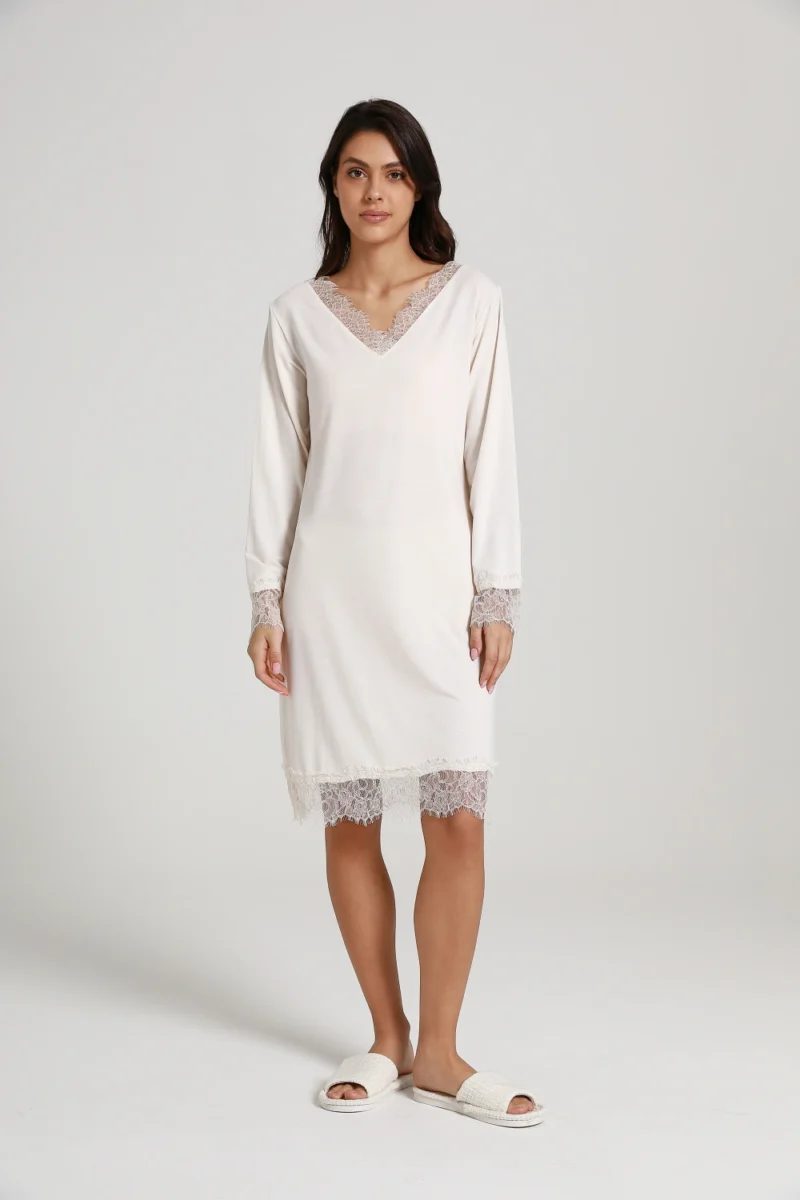 Spring Summer Long Sleeve Lace Nightgown
Spring Summer Long Sleeve Lace Nightgown -
 Spring Summer Women Polyester Nightshirt
Spring Summer Women Polyester Nightshirt -
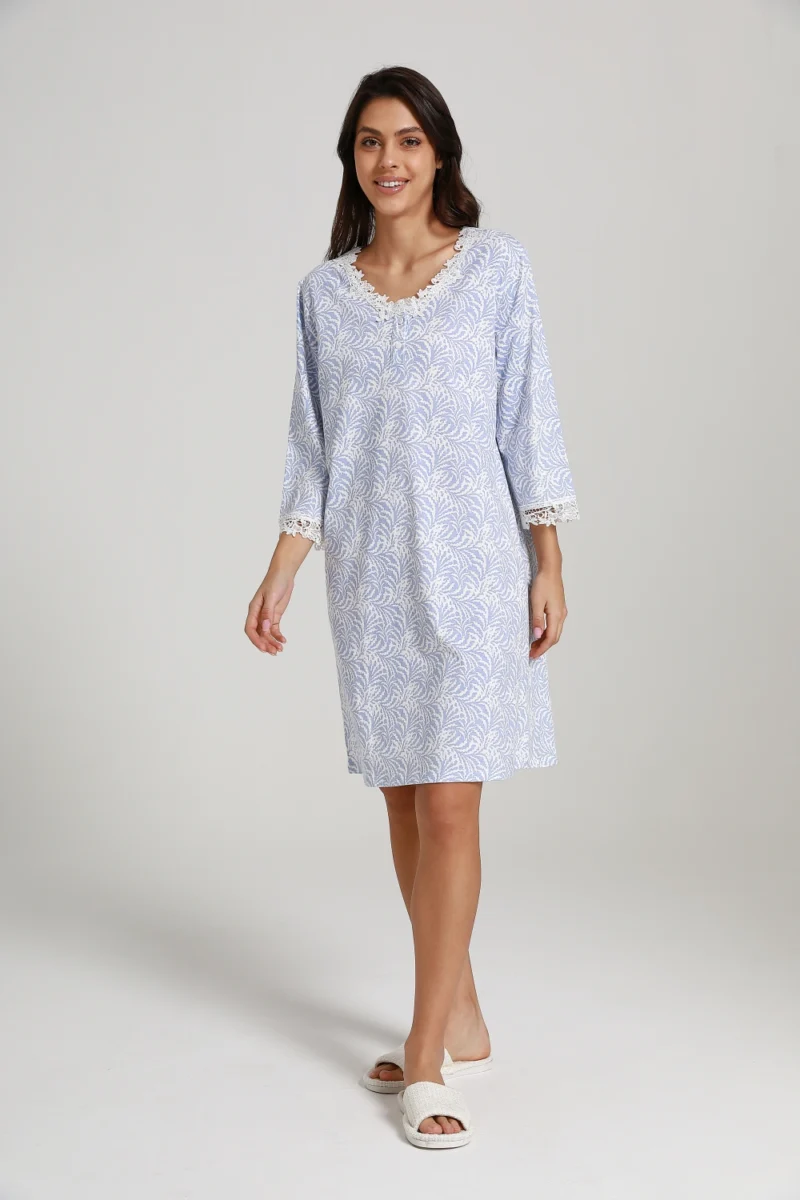 Spring Summer 60 Cotton 40 Polyester Pajamas
Spring Summer 60 Cotton 40 Polyester Pajamas -
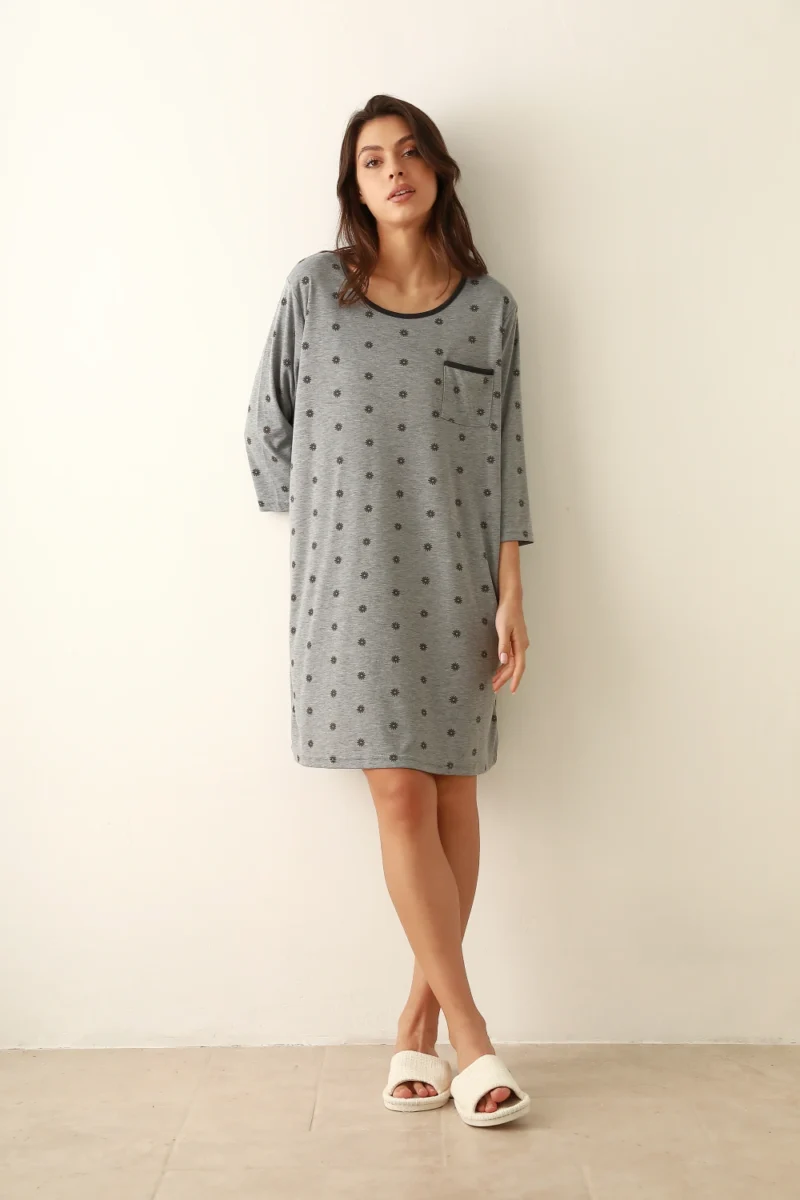 Spring Summer Polyester Nightdress
Spring Summer Polyester Nightdress
Sleepwear Design Elements That Enhance Comfort
While fabrics play a leading role in soothing sensitive skin, the design and construction of the pajamas are equally crucial. Even the softest material can become irritating if the seams are rough, tags are scratchy, or the fit is too tight. This is where thoughtful craftsmanship, informed by years of experience, truly shines.
Seamless Stitching: Less Friction, More Comfort
One of the first things our R&D team focused on during product development was minimizing friction points. Sensitive skin reacts to even the smallest irritation, which is why seam placement and construction techniques matter so much.
Instead of conventional overlock stitching, we use flatlock seams in most of our pajama lines. This method lies flat against the skin, reducing chafing and making the sleepwear feel more like a second skin. For certain sensitive-skin categories, such as eczema or post-surgical recovery, we even offer seamless or inverted seam options.
Flat Tags vs Tagless: A Small Detail with Big Impact
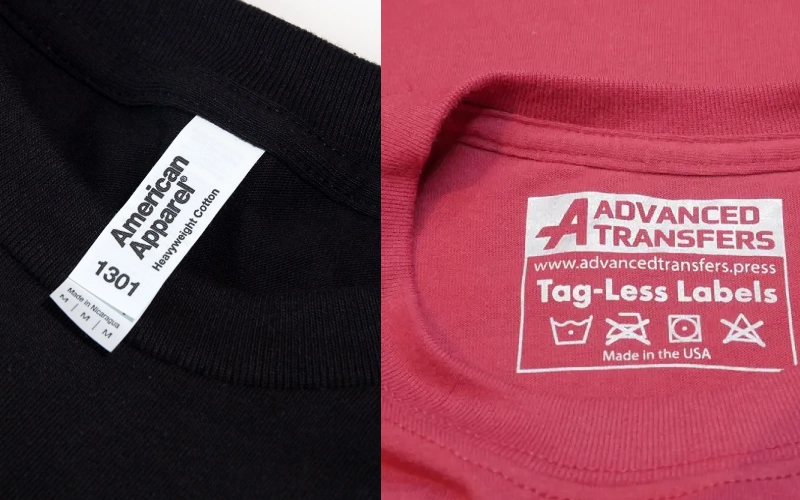
The tag—often overlooked—is one of the most common irritants for people with skin conditions. That’s why we ditched traditional sewn-in tags altogether for our core product lines. Our tagless printing technique uses water-based, non-toxic inks to print garment care information directly onto the inside of the fabric, ensuring zero contact irritation.
In a customer satisfaction survey conducted last year, 88% of respondents with sensitive skin reported a noticeable improvement in nighttime comfort after switching to our tagless designs.
Breathable and Moisture-Wicking Features
Overheating during sleep can trigger flare-ups, especially in those with rosacea, eczema, or heat-sensitive conditions. That’s why we incorporate ventilation panels, temperature-regulating weaves, and moisture-wicking fibers like bamboo and modal.
Our CoolFlow™ technology, used in our summer pajama sets, leverages micro-gaps in the weave to promote airflow, helping reduce sweat and heat buildup. It’s not just marketing—it’s lab tested and certified by OEKO-TEX® Standard 100 for chemical safety and skin compatibility.
Safety and Certifications That Matter
As a responsible manufacturer, we know certifications aren’t just badges—they’re your guarantee of trust. Sensitive skin wearers can’t afford to take risks with fabric treatments, dyes, or finishes. That’s why all of our sleepwear undergoes multi-stage testing and certification to meet the highest global standards.
OEKO-TEX® Confidence in Textiles
The OEKO-TEX® Standard 100 certification is one of the most rigorous in the world. It checks for harmful substances in every component of the product, from thread and buttons to fabric and dye. According to the OEKO-TEX® official website, products are tested for over 100 chemicals known to be harmful to health.
Every item we produce with this certification undergoes annual audits and batch testing to ensure consistency. We proudly display the OEKO-TEX® label because we believe your skin deserves transparency.
GOTS Certification for Organic Products
The Global Organic Textile Standard (GOTS) is the gold standard for sustainable and organic fabric production. A GOTS-certified product ensures the cotton is grown without pesticides and processed without harmful chemicals.
What makes GOTS even more valuable? It includes social responsibility and environmental impact—meaning your pajamas are made not only with safe materials but in ethical factories under fair working conditions.
We’ve earned this certification for our LunaLuxe™ and EczemEase™ lines, and customers constantly mention the added peace of mind it provides.
Our Compliance Process
Before any fabric makes it into our production line, it undergoes fiber analysis, shrinkage testing, pH balancing, and allergen screening. These internal tests go above and beyond what most manufacturers perform.
And for added assurance, we conduct external audits through third-party labs, making sure each batch aligns with both OEKO-TEX® and GOTS standards. We’re not just saying it—we’re proving it, one pajama set at a time.
Pajama Care Tips for Sensitive Skin Wearers
Even the best pajamas can lose their skin-friendly properties if they’re not properly cared for. As manufacturers who work with both retail clients and medical centers, we often get asked how to wash and maintain pajamas for sensitive skin. Here’s what we recommend:
Hypoallergenic Detergents Are a Must
Avoid regular commercial detergents that contain fragrances, brighteners, or enzymes. These ingredients can stay in the fabric even after rinsing and irritate your skin during the night. Instead, opt for hypoallergenic, fragrance-free detergents, ideally labeled as safe for baby clothes or sensitive skin.
Brands like Seventh Generation Free & Clear or ECOS Hypoallergenic are frequently recommended by dermatologists and pediatricians.
Washing Temperature Guidelines
Always follow the care instructions, but in general:
- Wash in cold to lukewarm water (30°C or below) to preserve fabric structure and reduce the risk of chemical breakdown.
- Avoid fabric softeners—they often contain waxy coatings that may block the fabric’s breathability.
Drying and Storage Best Practices
- Air-dry when possible. Excessive heat from dryers can degrade natural fibers and cause shrinkage.
- If you must machine dry, use the lowest heat setting and remove the pajamas while they’re still slightly damp.
- Store in a cool, dry place, away from sunlight and potential contaminants like scented sachets.
By following these care tips, you’ll not only extend the life of your pajamas but also preserve their skin-soothing qualities.
What Dermatologists Say About Pajama Choices
When it comes to clothing for sensitive skin, dermatologists are unanimous: fabric and fit matter more than most people realize. Sleepwear, worn for hours every night, plays a significant role in managing or exacerbating skin issues like eczema, contact dermatitis, or psoriasis.
Medical Recommendations
Dr. Aisha Graham, a board-certified dermatologist and eczema specialist based in Chicago, explains, “I always tell my patients to treat their clothing like an extension of their skincare routine—especially pajamas. If you’re using a steroid cream but sleeping in harsh fabric, you’re taking one step forward and two steps back.”
Dermatologists widely recommend:
- Natural, breathable fabrics like organic cotton, silk, or bamboo
- Loose-fitting designs to prevent friction and allow airflow
- Tagless construction and minimal seams to reduce irritation
- Avoidance of synthetic dyes or wrinkle-resistant finishes
These aren’t just suggestions—they’re prescriptions for comfort.
Studies from Clinical Dermatology Journals
A 2021 study published in the Clinical Dermatology Review showed that patients who switched to GOTS-certified organic cotton sleepwear reported a 43% reduction in itching and irritation within the first month of use. The same study highlighted that synthetic fibers, especially polyester and nylon blends, were often “trigger points” for dermatitis flare-ups.
Moreover, a peer-reviewed journal, Dermatitis, found that using untreated bamboo fiber garments helped reduce nighttime scratching by over 30% in atopic dermatitis patients compared to polyester sleepwear.
Common Triggers Linked to Sleepwear
Here are a few overlooked triggers linked directly to pajama material and design:
- Residue from manufacturing chemicals
- Sweat trapped in non-breathable fabrics
- Tight waistbands or elastic bands with rubber latex
- Rough stitching on seams and collars
That’s why dermatologists often refer patients to specialty sleepwear brands like ours—because we’ve engineered our products with these medical insights at the core.
Comparing Top Brands: What Sets Ours Apart
There are plenty of pajamas on the market that promise comfort, but few are actually designed with sensitive skin in mind. As a manufacturer, we’re not just another clothing brand—we specialize in skin-safe textiles with the backing of industry certifications, customer testimonials, and clinical insight.
Price vs Quality
Some brands cut costs by using polyester or cotton-poly blends, and while they may look similar, they don’t perform the same. Our products use certified organic and bamboo materials, which do cost more to source and manufacture—but the difference in quality, durability, and skin-friendliness is undeniable.
We also run in-house quality assurance tests that most mass-market brands skip, from checking pH levels to pre-wash shrinkage control.
Innovation in Fabric Engineering
Through partnerships with textile labs and dermatology clinics, we’ve developed proprietary blends like CloudSoft™, EczemEase™, and BambooSilk™, all of which have undergone real-world testing with sensitive-skin users.
These fabrics are engineered to:
- Reduce microbial buildup
- Prevent overheating
- Maintain softness after multiple washes
- Resist allergen accumulation (like dust mites and dander)
Most competitors don’t offer this level of precision—and it shows.
Commitment to Sensitive Skin Consumers
We design with empathy, because we listen to our customers. From plus-size options to adaptive pajamas for those with mobility issues, we’ve created a collection that feels as inclusive as it is skin-friendly.
Whether you’re a parent dressing a child with eczema or an adult navigating rosacea or contact allergies, our mission is the same: to help you sleep without discomfort.
FAQs
Can I wear polyester if I have sensitive skin?
Polyester is generally not recommended for sensitive skin. It’s a synthetic fabric that traps heat and moisture, which can aggravate conditions like eczema or dermatitis. Natural fabrics like cotton, bamboo, or silk are safer alternatives.
Are bamboo pajamas really hypoallergenic?
Yes! Bamboo viscose is naturally hypoallergenic and has antibacterial properties. It’s ideal for people with allergies, sensitive skin, or heat-related irritation. Just ensure it’s free from harsh dyes or chemical finishes.
What’s the best pajama set for eczema sufferers?
Our EczemEase™ Long Sleeve Set is a top pick. It’s made from dye-free, untreated organic cotton and features flat seams and a tagless design. It’s been tested by patients and recommended by dermatologists.
Are your fabrics pre-shrunk and chemical-free?
Absolutely. We pre-wash our fabrics during production to reduce shrinkage and test them for over 100 harmful substances under OEKO-TEX® certification. That means no pesticides, formaldehyde, or irritating dyes.
Do you offer plus-size or maternity options for sensitive skin?
Yes! We offer a full range of inclusive sizing from XS to 4XL, along with maternity and adaptive wear options. Comfort should be for everyone, regardless of size or stage of life.
How often should I replace pajamas for skin health?
We recommend replacing sleepwear every 12–18 months if worn regularly. However, if you notice pilling, loss of softness, or a decrease in breathability, it’s time to upgrade to a fresh, skin-safe set.
Conclusion
When it comes to sensitive skin, comfort isn’t just a luxury—it’s a necessity. At the intersection of science, craftsmanship, and empathy lies the perfect pajama, one that allows you to rest easy knowing your skin is safe.
With industry certifications like OEKO-TEX® and GOTS, dermatologist endorsements, and glowing customer reviews, our sleepwear collections have become trusted by people with the most delicate skin types. Whether you’re managing a chronic skin condition or simply seeking a higher standard of softness, our pajamas are built for you.
So tonight, give your skin the gift of breathable, chemical-free, and luxuriously soft comfort. Trust us—it’s a difference you’ll feel from the very first night.

